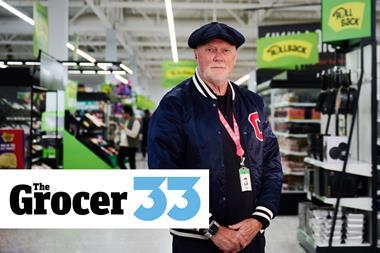Retail prices have fallen almost 2.5% since June, showing deflation is finally arriving in grocery.
However, as they increased a massive 8% in the same six-month period last year, prices remain higher year-on-year overall for now at least.
Over the course of 2009, the price of many key food commodities has fallen steeply, with some varieties of wheat down more than 50% year-on-year and rice, potatoes, dairy and other staples also substantially down from their peaks.
Retailers were initially sluggish to reflect the fall in the cost of commodities in their own prices, prompting critics to accuse them of attempting to boost their margins. Retailers countered that the delay was caused by long-term supply contracts.
However, retail prices have now started to drop, especially at Morrisons and Sainsbury's. Shelf prices at Morrisons are more than 5% lower than in June, while at Sainsbury's they are down 2.5%.
This trend has been less clear among the UK's two biggest retailers. Prices at Tesco continued rising for a month longer than at the other retailers, and it was not until November that they returned to their June levels. Prices at Asda have been volatile and have been influenced by its promotional offer. They now average 0.5% less than in June.
Prices are expected to continue on a downward trend in the early months of 2010, as the effect of lower cost prices and competitive activity continue to filter through the supply chain.
Year-on-year deflation appears imminent, as last December and this January saw large price spikes that the data suggests will not be mirrored next year meaning food will finally be cheaper than at its peak in 2008.
This, however, is not a uniform trend: in several key categories, cost pressures are still rising.
Confectionery has been particularly hard hit, as issues with supply have affected almost all of chocolate's key ingredients: sugar, cocoa and palm oil.
Both sugar and cocoa are more than 40% more expensive than this time last year. Sugar has been hit by flooding in India and drought in Brazil, while cocoa crops have dwindled as a result of ageing trees and black pod disease in key areas such as Ghana and the Ivory Coast.
Suppliers have dealt with spiralling costs by shrinking pack sizes and increasing prices several key Cadbury SKUs went up in price by more than 20% in Tesco and Sainsbury's earlier this month.
The weak pound is another issue. It has made imports more expensive and as the UK imports about half of its food, this is a major concern. Sterling's devaluation has also meant that UK consumers have not felt the full benefit of falling prices a trend that could continue.
Worse could be to follow: as commodity prices recover with the world economy, sterling looks unlikely to return to its previous levels, meaning higher costs for UK producers. Prices might fall for a time, but the decreases are unlikely to be dramatic or to last in the long term.
However, as they increased a massive 8% in the same six-month period last year, prices remain higher year-on-year overall for now at least.
Over the course of 2009, the price of many key food commodities has fallen steeply, with some varieties of wheat down more than 50% year-on-year and rice, potatoes, dairy and other staples also substantially down from their peaks.
Retailers were initially sluggish to reflect the fall in the cost of commodities in their own prices, prompting critics to accuse them of attempting to boost their margins. Retailers countered that the delay was caused by long-term supply contracts.
However, retail prices have now started to drop, especially at Morrisons and Sainsbury's. Shelf prices at Morrisons are more than 5% lower than in June, while at Sainsbury's they are down 2.5%.
This trend has been less clear among the UK's two biggest retailers. Prices at Tesco continued rising for a month longer than at the other retailers, and it was not until November that they returned to their June levels. Prices at Asda have been volatile and have been influenced by its promotional offer. They now average 0.5% less than in June.
Prices are expected to continue on a downward trend in the early months of 2010, as the effect of lower cost prices and competitive activity continue to filter through the supply chain.
Year-on-year deflation appears imminent, as last December and this January saw large price spikes that the data suggests will not be mirrored next year meaning food will finally be cheaper than at its peak in 2008.
This, however, is not a uniform trend: in several key categories, cost pressures are still rising.
Confectionery has been particularly hard hit, as issues with supply have affected almost all of chocolate's key ingredients: sugar, cocoa and palm oil.
Both sugar and cocoa are more than 40% more expensive than this time last year. Sugar has been hit by flooding in India and drought in Brazil, while cocoa crops have dwindled as a result of ageing trees and black pod disease in key areas such as Ghana and the Ivory Coast.
Suppliers have dealt with spiralling costs by shrinking pack sizes and increasing prices several key Cadbury SKUs went up in price by more than 20% in Tesco and Sainsbury's earlier this month.
The weak pound is another issue. It has made imports more expensive and as the UK imports about half of its food, this is a major concern. Sterling's devaluation has also meant that UK consumers have not felt the full benefit of falling prices a trend that could continue.
Worse could be to follow: as commodity prices recover with the world economy, sterling looks unlikely to return to its previous levels, meaning higher costs for UK producers. Prices might fall for a time, but the decreases are unlikely to be dramatic or to last in the long term.
















No comments yet